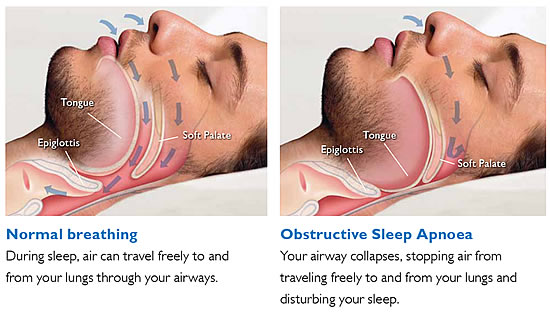What is Sleep Apnoea
Sleep Apnoea is defined as the cessation of breathing during sleep. Apnoea is a Greek word which means ‘without breath’.
An Apnoea is a stoppage of breath for 10 seconds or longer. A hypopnoea is a partial loss of breath that last 10 seconds or longer.
There are three types of Sleep Apnoea:
Obstructive Sleep Apnoea (OSA)
This is the most common form of Sleep Apnoea. There are three levels of OSA:
- Mild – 5/15 Apnoeas per. hour
- Moderate – 15/30 Apnoeas per. hour
- Severe – 30 plus Apnoeas per. hour
Central Sleep Apnoea (CSA)
This is where the brain does not send proper signals to the muscles that control a person’s breathing
Mixed Sleep Apnoea (MSA)
This is a combinations of OSA and CSA
Sleep Apnoea is now recognised as a serious medical condition and one of the most common Sleep Disorders.
This cycle of Apnoea/Hypopnoea or cessation of breathing will repeat itself throughout the night’s sleep and the sufferer will wake up each morning feeling un-refreshed and completely unaware of what has happened during the night.
It is the person’s bed partner that may be the first to notice what is actually occurring. The normal comment from a partner is that the sufferer initially starts snoring followed by a silence or gurgling sound suspecting that they have stopped breathing, which can last for anything from 10 seconds to two minutes, followed by snorting or gasping as breathing begins again. This cycle typically continues throughout the night.
During the day you will have sufficient muscle tone to keep your airway open allowing you to breathe normally. However when you suffer from Sleep Apnoea you do not have sufficient muscle tone to keep your upper airway open and as a result of which your airway collapses. Please see below image.
Symptoms of Sleep Apnoea
The most common symptoms of Sleep Apnoea are as follow:
- Loud snoring followed by pauses and gasps
- Waking up un-refreshed each morning
- Morning headaches
- Forgetfulness
- Depression or anxiety
- Lack of concentration resulting in poor work performance
Causes of Sleep Apnoea
Some of the most common causes that can contribute to a person suffering from Sleep Apnoea are as follows:
- Obesity
- Alcohol
- Smoking
- Large Uvula
- Large Tonsils or Adenoids
- Large Soft Palate
- Enlarged Tongue
Possible health risks in not attending to Sleep Apnoea
There is considerable medical evidence to suggest that Sleep Apnoea if left untreated and not properly managed can lead to:
- Road traffic or work place accidents
- Cardiovascular Disease
- High Blood Pressure
- Diabetes
- Depression
- Stroke
- Sudden Death
What action should you take if you suspect that you suffer from Sleep Apnoea
Contact SA Medical to speak with a member of our team who suffers from Sleep Apnoea and they will advise you on the appropriate action you should take.
Treatment for Sleep Apnoea
The Gold Standard in treating Sleep Apnoea is CPAP therapy (Continuous Positive Airway Pressure).
Call a member of our team to help you get your best night’s sleep.

